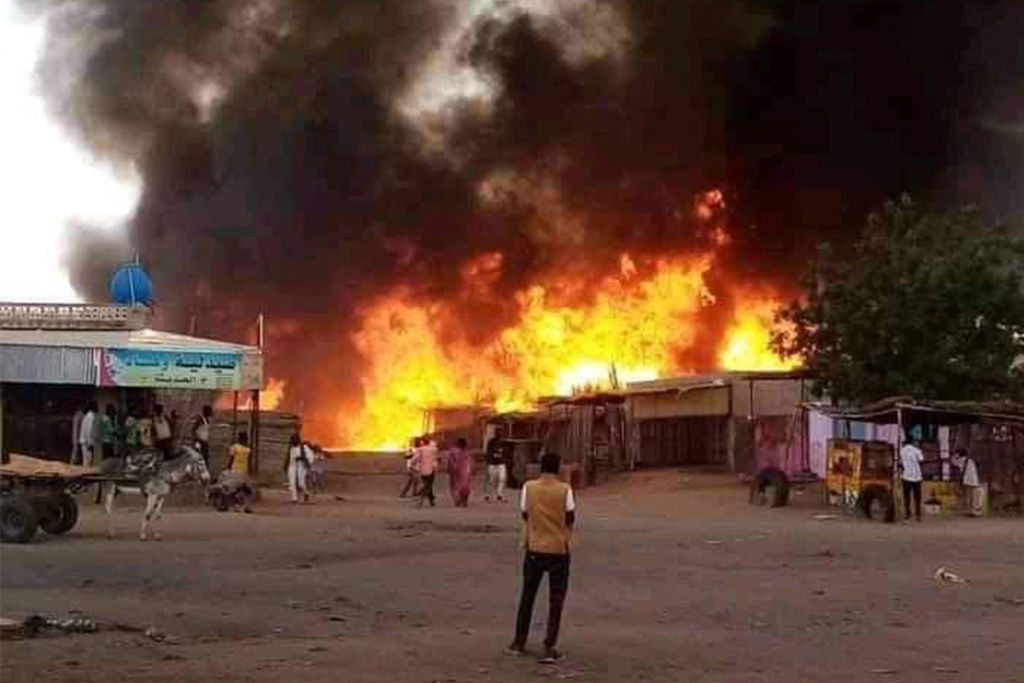ADF STAFF
El-Fasher, the besieged capital of North Darfur, remains in the hands of the Sudanese Armed Forces (SAF) after more than four months of assaults by the Rapid Support Forces (RSF). The city has become strategically and symbolically important in the battle for control of Darfur.
North Darfur, the largest state in Sudan’s western Darfur region, has remained out of the RSF’s control for more than nine months after its forces conquered other states in the region. El-Fasher, one of Sudan’s largest cities, has been under constant RSF attack since April. The SAF and its allied local militias have held the RSF at bay.
Darfur Gov. Minni Minnawi’s Sudan Liberation Movement/Army and the Justice and Equality Movement (JEM) led by Jibril Ibrahim abandoned their professed neutrality earlier this year and created the Joint Force of Armed Struggle Movements to help the SAF defend el-Fasher and North Darfur.
Government control of el-Fasher has turned the city into a keystone for the SAF’s 18-month fight against the RSF.
“Losing a key urban center such as el-Fasher could worsen regional instability, potentially spreading conflict and displacement to nearby countries like Chad, Niger and Mali,” analyst Ibrahim Z. Bahreldin, an associate professor at Saudi Arabia’s King Abdulaziz University, wrote recently for The Conversation.
A city of nearly 2 million people, el-Fasher is home to a diverse mix of ethnic groups, including non-Arab communities such as the Fur, Zaghawa and Masalit. The RSF has targeted all of these communities during the current war, just as the RSF’s predecessor the Janjaweed did during the Darfur genocide 20 years ago.
El-Fasher also is home to the Abu Shouk, Zamzam and Al Salaam displaced-person camps created during the Janjaweed attacks. The city has become a haven for 500,000 who fled fighting in other Darfuri states and the Khartoum region, according to the United Nations.
“The besieged city is running out of food, fuel, and medical supplies, amplifying the suffering of residents, who have few places to run or hide,” the Sudan War Monitor wrote recently.
Experts fear that the fall of el-Fasher could lead to a repeat of the slaughter that happened during the early 2000s. It also would give RSF leader Gen. Mohamed Hamdan “Hemedti” Dagalo total control over western Sudan.
Under that scenario, Hemedti could turn Darfur into his power center, essentially creating a state within a state that would further fragment Sudan, according to analyst Teresa Noguiera Pinto. Darfur was largely independent until 1916, when the British folded it into Sudan.
Achieving control of North Darfur also would give the RSF an uncontested connection to its allies in Libya. There, eastern military leader Field Marshal Khalifa Haftar and his allies in Russia’s Wagner Group mercenaries supplied the RSF with surface-to-air missiles and other weapons soon after war broke out in April 2023.
Control of North Darfur would give the RSF a bridge to Sudan’s Northern State, which remains under SAF control along with River Nile and Red Sea states, according to experts.
In their attempt to conquer North Darfur, RSF fighters engage the SAF and its allies in areas beyond el-Fasher. RSF fighters have taken control of Mellit City, about 60 kilometers north of el-Fasher, and burned numerous Zaghawa villages in the region. Fighting has taken place near RSF strongholds such as al-Zorg, home to a major RSF weapons depot near the Libyan border; Wadi Arambaa; and Umm Baar; according to the Armed Conflict Location & Event Data Project.
Since the RSF began its assault on el-Fasher, hundreds of residents have died and thousands more have been injured. Local hospitals are overwhelmed as medical supplies dwindle.
“People are arriving with abdominal injuries, chest wounds, brain trauma and open fractures. Some have gunshot wounds, some have been wounded by bomb fragments and others have been wounded by shelling,” Claire Nicolet, head of emergency programs for Doctors Without Borders, said in a statement in May. At the time, el-Fasher’s South Hospital had just one surgeon.
As the RSF has consolidated its control over the rest of Darfur, humanitarian groups such as the Raoul Wallenberg Centre say there is clear evidence of a return to its previous genocidal tactics in el-Geneina, the capital of West Darfur, and Nyala, the capital of South Darfur.
Observers worry that the same or worse could occur in North Darfur if the RSF takes el-Fasher.
“There are now fears that if the RSF seizes el-Fasher, it will launch deadly reprisals against civilians that it perceives as aligned with the army and armed groups,” South Darfuri human rights advocate Ahmed Gouja wrote recently for The New Humanitarian. “Those from the Zaghawa community are especially at risk.”

